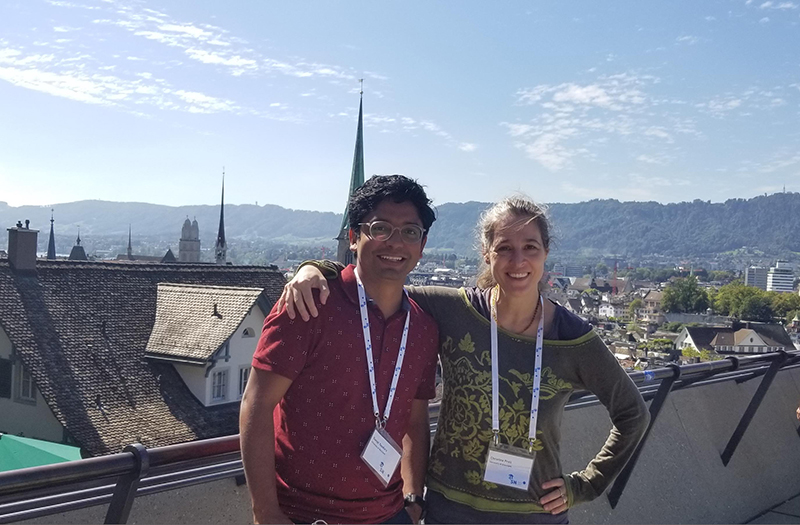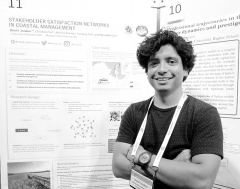Knauss legislative fellowships in Congress help build careers — and they're fun and educational. See our video and fact sheet for details.
My Scientific Crush: The Chesapeake Bay
Truth be told, at the start of my PhD journey I did not expect to focus all of my research on the Chesapeake Bay. A combination of opportunity and pragmatism led me to let go of my initial study area in my home country of El Salvador and pursue a fellowship with Maryland Sea Grant. I had no idea I was on course to finding my scientific love.
Coming from El Salvador, I had been a first-hand witness to the environmental hazards that threaten coastal communities. There, agricultural and fishing communities on the Pacific coast are increasingly struggling to tame the restless ocean while at the same time trying to manage industrial and agricultural pollution. Sound familiar?
The parallels between the environmental challenges of Maryland and El Salvador resonated with me as I began to learn more about the struggles for communities around the Chesapeake Bay. I discovered a trove of scientific and public information available about the Bay’s environmental challenges. How flooding on the Eastern Shore disrupts economic and social activities, and how nutrient pollution in the Bay is associated with changes in water temperature, acidity, and lack of oxygen—all of which in turn can harm the health of Bay organisms and ecosystems in different ways. It can reduce biodiversity, result in reductions in fish populations, and harm industries that depend on them, not to mention the dollars that come into an economy for recreational pursuits because not many people want to swim and boat in effected water. The research I found is informing policy efforts to help clean the Bay and increase the resilience of coastal communities to climate-related hazards. I’ve learned much of this work while doing a literature review on the Chesapeake Bay, which I have submitted for publication to a scientific journal. I was excited to learn so much here in Maryland that I can share with El Salvador in the future.
During my PhD work in geographical sciences at University of Maryland, College Park, I’ve focused on studying how people from different backgrounds (government officials, scientists, community members, etc.) come together and establish partnerships to address climate change impacts in the Chesapeake Bay. These partnerships can be understood as forums where shared inclusive visions are defined and projects can be implemented to meet the needs of all parties involved. I decided to focus on this subject after I met with Melissa Kenney, the co-principal investigator on my Maryland Sea Grant research project on monitoring the capacity of Maryland to adapt to climate changes. She shared with me the importance of engaging with many parties when studying resilience to climate change in Maryland and taught me that in order to develop a measure of resilience we first needed to define resilience in a meaningful way for all stakeholders. At that time, I was working with my advisor, Christina Prell, on the methodology of social network analysis to study how a network of fishers in a Salvadoran coastal community collaborated to maintain a sustainable fishery. Unfortunately, or perhaps fortuitously, I had no funding to pursue that line of research. The lack of funding for El Salvador research and the timely opportunity to join Kenney’s project is what led me where I am now. The cool thing is that I ended up applying the same methodological principle in my new research area in Maryland.

I was in the right place at the right time. What made me fall in (scientific) love with the Chesapeake Bay was not the large number of documents I read or the data I analyzed over the last couple of years. In fact, what caught my (scientific) heart was that I could relate to the attitude of the researchers, practitioners, and the affected communities. They persevere, collaborate, and solve problems in response to the growing threat of climate hazards. This metaphoric resilience to work together in studying and addressing climate-oriented problems captivated me.
I feel so part of this place and, like young lovers, I do not want to spend a moment away from it. I have learned the good and the ugly. I know the benefits of the existing information, the strong scientific and practitioner community, and the peoples’ resilience. I also know its weaknesses, blind spots, and the challenges ahead for the coastal communities and the resource managers at different levels of government. Oh, and there is also the seafood . . . did I mention that I love seafood? Well, that might have played a role in my affinity to this region as well, but we will pretend it was a minor role.
Now two years have passed since I became a Maryland Sea Grant fellow and the fellowship, as well as the PhD, are approaching the end. I am now embedded in the scientific story of the Chesapeake Bay, which has allowed me to travel abroad and present my work at two prestigious international conferences: the International Conference of Social Network Analysis in the Netherlands in 2018 and the European Conference on Social Networks in Switzerland in 2019. It has been so meaningful to me to represent Maryland and the Chesapeake Bay at these conferences. Some colleagues have described me as the Salvadoran who speaks with an American accent and does groundbreaking research in Maryland. (Well, I may have added “groundbreaking.”) Certainly, researchers around the world are engaging in similar scientific pursuits, and the Chesapeake Bay is not alone. In fact, in some ways we are leading the way.
No relationship is perfect, and my relationship with the Chesapeake Bay has not been either. The landscape keeps changing and new challenges will surely continue to arise. But I am thrilled that my PhD, this monumental journey in my life, will always be linked to the scientific community of the Chesapeake Bay. I feel lucky to have worked with well-respected scientists and practitioners, and grateful for how I have been empowered to pursue science-based solutions in an atmosphere that is encouraging for young scientists like myself to pursue meaningful research that affects people’s lives.
My next step in the relationship is not entirely certain, but I’m going to the Netherlands, with all that I’ve learned here, and will use it as a foundation to study more about how the Dutch have handled their coastal issues. But when you have been as close to a topic as I have been to the Chesapeake, you never really leave it. My relationship with Maryland is stronger than ever. Wherever my scientific journey will take me next, I will always hold the state of my alma mater, the study area of my PhD research, and all my professional contemporaries deep in my heart.
See all posts to the Fellowship Experiences blog

